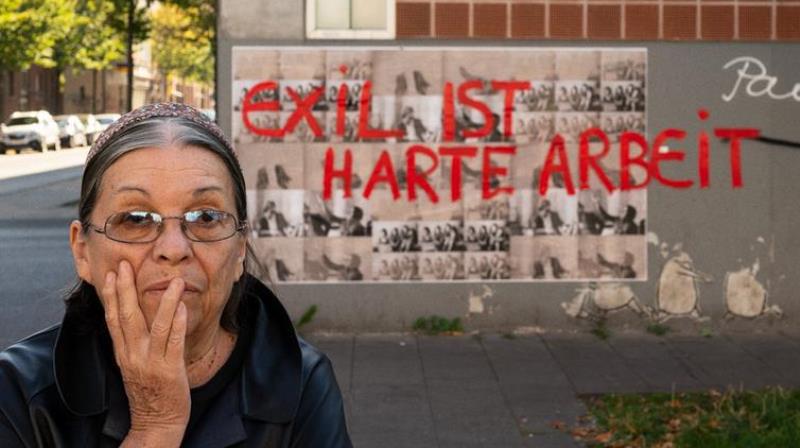"Female immigrants are doubly imprisoned"

You were the first female artist in France in the early 1970's to take a video camera in your hand; the first feminist to document the repression in women's prisons; and you were the first activist to focus in your art on the living situation of migrant workers. Why is your name known only to insiders?
Nil Yalter: Yes, that's right. For the first time, I have a big retrospective in such a wonderful and significant museum. And I am now 81 years old.
In the 1970s you joined the Femmes/Art ("Women/Art") and Femmes en lutte ("Fighting Women") in Paris, two associations of female artists who insisted on the recognition of women in a sexist art world. How at this time did you become the first artist in France to utilise the emerging video medium?
Yalter: At that time I discovered the Portapak, the first portable video machine. In 1973 I had an important exhibition at the Museum of Modern Art where I exhibited a replica of a nomad yurt. Someone brought me this Portapak and I began filming and taping. I was immediately fascinated by the possibilities. I did the first shots around the yurt and filmed children who came in and out of the tent, even babies. So I made a documentary video. And so that's how I started.
In your first video performance, you film your hand writing text on your stomach: it's a work dealing with the hatred of the clitoris in male Muslim culture.
Yalter: The excerpt is from a publication by the historian Rene Nelli. It is a very political text. He talks about how women are physically and morally castrated from their pleasure and their sexuality. It is a very important text. I wouldn't call it a performance; I performed for a video art piece.
From the mid-70s your work enters a new phase and you start interviewing migrant workers in France.
Yalter: Not only in France, but in Belgium, the USA and Germany as well. But, yes, also in the Parisian banlieues.
That sounds more like a sociological approach. Have you always wanted to make art out of this material?
Yalter: Yes, always. I always wanted to make art. The initial spark was an encounter with nomads in Anatolia who live in those roundhouse tents. They told me that every woman has a husband or a brother or a son or an uncle who went to the city and settled in the favelas or in the slums. And some of them went straight to Germany.
I got interested in the economic refugees, wondering what became of them. Why did they come to Germany or France? I worked a lot with the social workers, Turkish social workers who live in France and helped the immigrants. In Germany it was better organised. The immigrants learnt German language while working in the factories, but in France it was not like that. So they ended up with little mastery of the language. Even those who attempted to acquire some French through their contact with the social workers.
What did you learn about the female immigrants' situation?
Yalter: For them, it's like being doubly imprisoned. The men go out to cafes and meet up with each other; or they are working so at least they're getting some notion of the language. But the women are cooped up in social housing – huge buildings like cages. The children go to school, so they speak better French than Turkish. As a result, the women rely on their children to take them out and translate when they go shopping once a week. Otherwise their lives are spent sitting at home and staring at the walls.[embed:render:embedded:node:34780]We are currently going through radical political changes in Europe and the world. But in contrast with the enthusiasm of the revolutionary movements of 1968, we are seeing a new aggressive form of de-democratisation. How do you view these changes?
Yalter: I find the atmosphere very threatening. Last year my exhibition was being shown in the centre of Vienna and someone complained about the poster, with its photos of migrants and the title – "Exile is a hard job". He didn't want to see photos of immigrants and he started shouting at the gallery owner.
You have been living in Paris for a long time. How do you interpret the yellow vest protests?
Yalter: It's an interesting movement. It doesn't have a head, there is no structure – it started out very spontaneously. Some, maybe half of them, are very sincere. However, the other half is very right-wing, so all it is doing is helping Le Pen's party. I must say I'm worried. Italy's prime minister is very interested in the yellow vests — and very friendly with Marine Le Pen [the Front National]. All this is of great concern to me. I no longer feel at ease in Paris. I love Paris. I've been there for such a long time. But I feel menaced. How am I going to go on living in the city when Marine Le Pen says that to be French, you have to have lived in France for five generations? It reminds one of certain things.
Interview conducted by Sabine Oelze
© Deutsche Welle 2019
